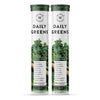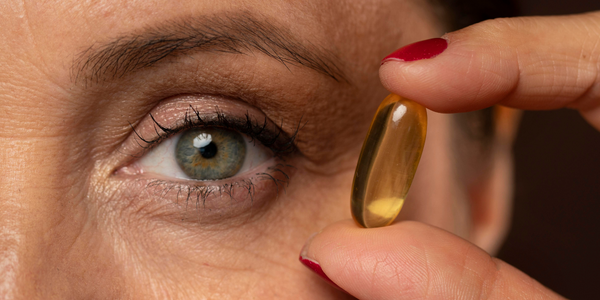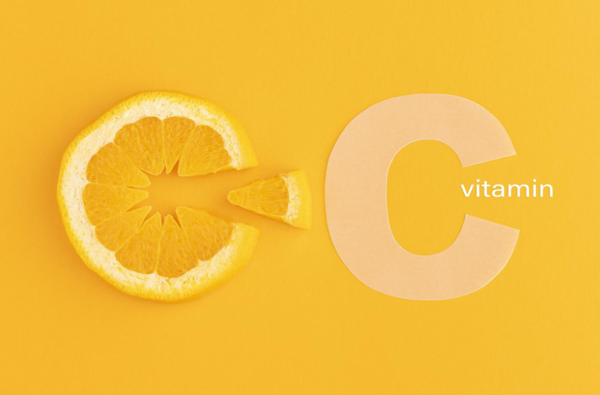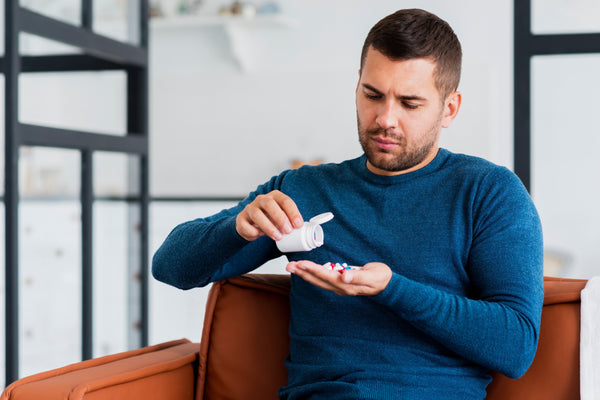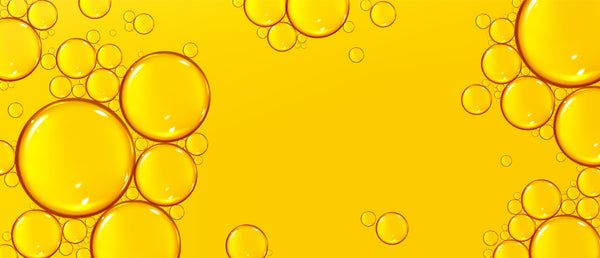You must have heard a lot about antioxidants. It has become a health buzzword; often comes up in discussions about nutrition, wellbeing, good health, and fitness. But beyond the entire buzz, what are antioxidants? How important are they? What are their health benefits? And why is it very important nowadays to take the antioxidants in our daily diet?
Free-Radicals
To understand antioxidants, you first need to know about free radicals.
Free radicals are molecules/atoms having an unpaired electron. They are basically single and eagerly ready to mingle, so they are always searching for another electron to pair up with. This makes them highly reactive.
Free radicals cause damage to important components of cells such as Cell DNA and cell membranes by stealing their electrons through a process called oxidation ( free radical damage is also called "oxidative damage"). These damaged cells lose their ability to function normally, which may cause cell death, and closely associate them with early signs of aging, cancer, Alzheimer's, and many other degenerative diseases.
Few free-radicals are part of our body's natural defense system and our body repairs the damage caused by them on its own. But when there are too many of them our body is not able to repair the natural damage anymore.
Free- radical Damage Includes:
- Deterioration of the eye lens contributes to blindness and cataract.
- Poor Immunity and immune response.
- Inflammation of the joints (arthritis)
- Damage to nerve cells in the brain contributes to Parkinson’s and Alzheimer’s disease
- Accelerated the aging process
- Increased risk of coronary heart disease, since free radicals increase LDL (So-called bad cholesterol).
- Increased risk of certain cancers, triggered by damaged cell DNA.
External factors which trigger the free-radical formations in the body are poor diet, alcohol, tobacco, smoke, air pollutants, exposure to chemicals like pesticides/drugs and UV exposure and many more. In fact, healthy act like "exercising" also trigger the free-radicals’ formation in our body.
What is the solution then? Should I stop exercising?
The Solution is Antioxidants – The Super Man!
Adding more antioxidant-rich foods in your diet can save you from free-radical damage.
Antioxidants are stable molecules containing paired electron and can share an electron with the free radical, thus stabilizing it. Antioxidants are supplement foods that neutralize and remove the free radicals from the bloodstream and this prevents free radicals from attacking other cells and triggering the degenerating diseases.
"Free radicals are like the drunken unstable friend who shows up at the party and starts breaking things. Whereas, an antioxidant is like a well-wisher who takes care of that drunken friend and calms her down. Needless to say, without the presence of well-wishers (antioxidants), free radicals could ruin the party"
What all other benefits of Antioxidants?
-
Sunburn protection – Vitamin-C, Vitamin-E, and selenium antioxidants have been
 proven to decrease the effect of the sun on the skin and actually prevent further damage.
proven to decrease the effect of the sun on the skin and actually prevent further damage. - Anti-Aging - Prevent the skin cells from damage and also preserves tissue elasticity and slows down the aging and hardening of tissues associated with oxidation.
- Cardiovascular Diseases – Antioxidants prevent heart diseases & stroke by raising HDL (so-called good cholesterol).
- Reduces the risk of cancer – Studies have found that people who eat more fruits and veggies have a lower risk of cancer. It’s a delicious way to cut your cancer risk!
- Reduces diabetes and its complications – High blood sugar creates free radicals, so everyone with diabetes or pre-diabetes could benefit from a nice hit of extra antioxidants.
- Defends against dementia – Research has found that people who consumed the most vitamin C & E cut their risk of dementia by up to 50%!
- Protect our eyes – against macular degeneration and cataracts. Vitamins C & E and beta-carotene are mainly involved in the process of eye protection.
- Immunity Support – Powerful antioxidants in spirulina have been found to boost the immune system while also protecting cell membranes.
- Helps to eradicate the effects of air pollution – Research has found that Vitamin C is an important nutrient to protect the lungs from pollution, especially if one were to suffer from asthma or COPD.
- Reduces inflammation – Help to reduce as well as repair cells injured by inflammation. Where to find antioxidants?
Antioxidants are naturally occurring compounds in most foods. Our bodies also make it. Antioxidants are a part of the body’s natural defense system against cellular damage. But, as we age, the ability to produce antioxidants declines.
To maintain the balance, a continual supply of dietary antioxidants is necessary.
Plant foods are rich sources of nutrients as well as antioxidants. Antioxidants are most plentiful in fruits and berries and green vegetables, as well as other foods including nuts, oilseeds, legumes, pulses, and whole-grains.
Plant foods are rich sources of nutrients as well as antioxidants. They are most plentiful in fruits and berries and green vegetables, as well as other foods including nuts, oilseeds, legumes, pulses, and whole-grains.
| Antioxidants | Food Source |
| Vitamin C | Broccoli, Brussels sprouts, cantaloupe, cauliflower, grapefruit, leafy greens kale, kiwi, lemon, orange, papaya, strawberries, tomatoes, bell peppers, chili, gooseberry. |
| Vitamin-E | Nuts like almonds, walnuts, pistachio, peanuts, Vegetable oils, avocado, leafy greens (beet, mustard, turnip),red peppers, spinach (boiled), & sunflower seeds |
| Carotenoids ( Beta-carotene & Lycopene) | Yellow and orange foods like apricots, cantaloupe, carrots, bell peppers, mangos, oranges, peaches, pumpkin, sweet potato, tomatoes, papaya, watermelon |
| Phenolic Compounds like Flavones, Polyphenols, Flavonoids | Quercetin (apples, red wine, onions), catechins (tea, cocoa, berries), resveratrol (red and white wine, grapes, peanuts, berries), coumaric acid (spices, berries), anthocyanins (blueberries, strawberries) |
| Lutein | Eggs, green, leafy vegetables like spinach and corn. |
| Selenium | Poultry, barley, Brazil nuts, fish, shellfish, beef, brown rice |
| Manganese | seafood, lean meat, milk and nuts |
| Zinc | Beef, poultry, oysters, shrimp, sesame seeds, pumpkin seeds, chickpeas, lentils, cashews, fortified cereals. |
Food or Supplement?
Foods have many different nutrients and fiber, all of which work together. But if you are not able to get enough fruits, berries and green vegetables in your diet; a supplement derived from natural foods and green vegetables can come to the rescue. You can give Wellbeing Nutrition's Daily Greens a try. Each tablet of Daily Greens contains multivitamins from 39 farm-fresh greens, veggies, fruits and antioxidant rich superfoods. All you need to do is add a tablet in a glass of water and allow it to dissolve. One tablet everyday will help you fight free radical activity in your body.
Take Away
Now that we have taken a look at antioxidants, it's time to eat fruits, vegetables, greens and load your daily diet with as many antioxidant-rich foods as you can. They will help protect you from many degenerative diseases such as heart ailments, cancer, diabetes, vision loss and many more. Feast on a variety of whole plant foods and your body will thank you for the rest of your life.
We hope that was helpful! If you have any other questions about antioxidants and their usefulness in daily life, leave them in the comments below! We would love to answer them!
References:
- Young IS, Woodside JV Antioxidants in health and disease, Journal of Clinical Pathology 2001;54:176-186. (https://jcp.bmj.com/content/54/3/176)
- Pham-Huy LA, He H, Pham-Huy C. Free radicals, antioxidants in disease and health. Int J Biomed Sci. 2008;4(2):89-96. (https://www.ncbi.nlm.nih.gov/pmc/articles/PMC3614697/)
- Phaniendra A, Jestadi DB, Periyasamy L. Free radicals: properties, sources, targets, and their implication in various diseases. Indian J Clin Biochem. 2015;30(1):11-26. doi:10.1007/s12291-014-0446-0
(https://www.ncbi.nlm.nih.gov/pmc/articles/PMC4310837/) - Sergio Di Meo, Paola Venditti, "Evolution of the Knowledge of Free Radicals and Other Oxidants", Oxidative Medicine and Cellular Longevity, vol. 2020, Article ID 9829176, 32 pages, 2020. https://doi.org/10.1155/2020/9829176. (https://www.hindawi.com/journals/omcl/2020/9829176/)
- Huang D. Dietary Antioxidants and Health Promotion. Antioxidants (Basel). 2018;7(1):9. Published 2018 Jan 12. doi:10.3390/antiox7010009. (https://www.ncbi.nlm.nih.gov/pmc/articles/PMC5789319/)
- Wilson DW, Nash P, Buttar HS, et al. The Role of Food Antioxidants, Benefits of Functional Foods, and Influence of Feeding Habits on the Health of the Older Person: An Overview. Antioxidants (Basel). 2017;6(4):81. Published 2017 Oct 28. doi:10.3390/antiox6040081. (https://www.ncbi.nlm.nih.gov/pmc/articles/PMC5745491/)









